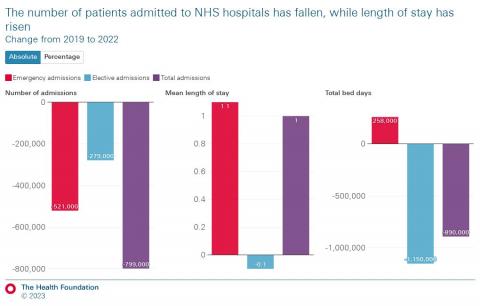Even though the NHS admitted 800,000 (12%) fewer people to hospitals in England last year compared to 2019, the average length of stay increased, new research from the Health Foundation has found.

England saw 6.8 million admissions in 2019 with the average time a patient stayed in hospital amounting to 7.3 days, whereas in 2022, despite the reduced demand, the length of stay was a full day longer.
The think tank believes that, because the NHS is at its limit with capacity and the amount of time patients are staying in hospital is increasing, the health service has had to raise admission thresholds; essentially “rationing care” by admitting fewer patients.
The trends throw into question the feasibility of the NHS’s ambitious recovery targets if the incredible pressure it is under continues, warns the Health Foundation.
Perhaps most concerningly, the report also showed that the drop in hospital admissions was most stark in the most deprived areas, with figures indicating that 80,000 fewer patients were admitted between 2019 and 2022 – more than twice as much as the 35,000 decrease observed in England’s least deprived areas.
This is particularly dangerous as, because those living in the most deprived areas are already more likely to have more complex healthcare needs, health inequalities could widen even further.
Thought leaders in the health sector are still unsure about the reasons behind the increase in length of stays, although the Health Foundation offer discharge delays, sicker patients due to longer waiting times, and the presence of Covid-19 as possible reasons.
One of the report’s authors, Charles Tallack, who is also the director of data analytics at the Health Foundation, said: “Hospitals are stretched to the limit, with bed occupancy well above safe levels. Patients are staying longer in hospital than before the pandemic, due to a range of factors including the ongoing impact of COVID-19 and delayed discharges.
“As a result, hospitals appear to have had little choice but to increase admission thresholds and reduce the number of patients being admitted, particularly in deprived areas of the country.
‘Years of under investment has seen hospital bed capacity come under real strain and social care and community services are severely stretched.
“The NHS has a huge task to recover services and improve access to care but it’s clear that more investment is needed to boost capacity inside and outside hospitals if these ambitions are to become a reality.”
Image credit: iStock



















